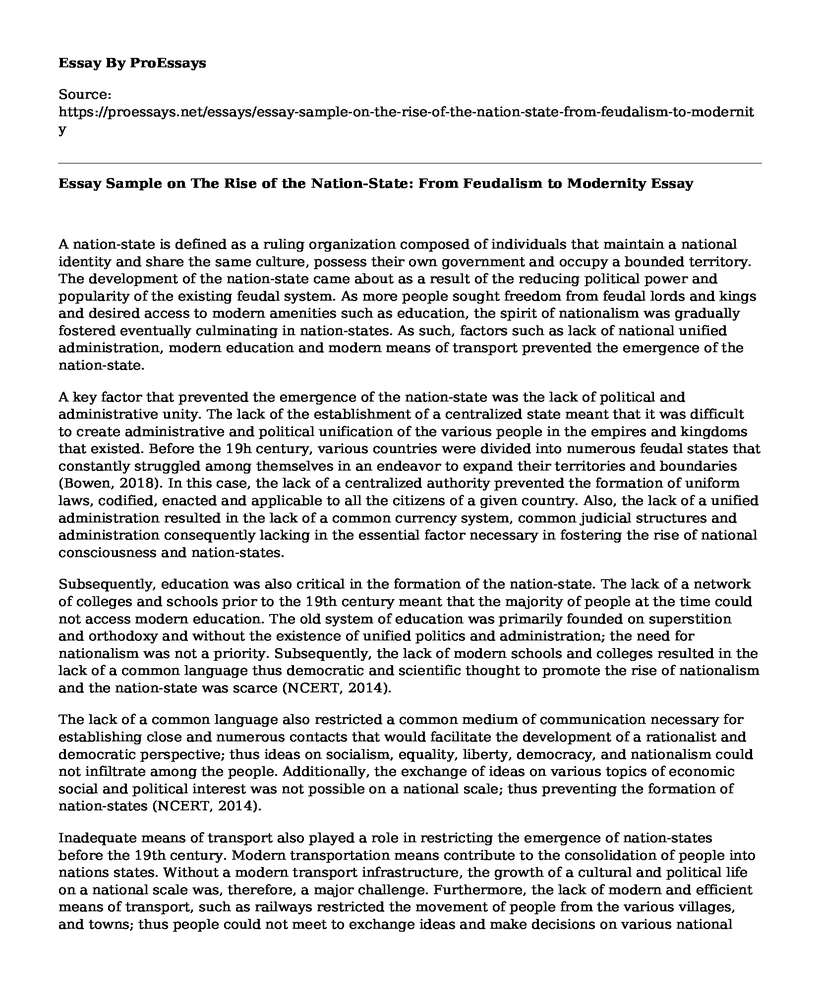A nation-state is defined as a ruling organization composed of individuals that maintain a national identity and share the same culture, possess their own government and occupy a bounded territory. The development of the nation-state came about as a result of the reducing political power and popularity of the existing feudal system. As more people sought freedom from feudal lords and kings and desired access to modern amenities such as education, the spirit of nationalism was gradually fostered eventually culminating in nation-states. As such, factors such as lack of national unified administration, modern education and modern means of transport prevented the emergence of the nation-state.
A key factor that prevented the emergence of the nation-state was the lack of political and administrative unity. The lack of the establishment of a centralized state meant that it was difficult to create administrative and political unification of the various people in the empires and kingdoms that existed. Before the 19h century, various countries were divided into numerous feudal states that constantly struggled among themselves in an endeavor to expand their territories and boundaries (Bowen, 2018). In this case, the lack of a centralized authority prevented the formation of uniform laws, codified, enacted and applicable to all the citizens of a given country. Also, the lack of a unified administration resulted in the lack of a common currency system, common judicial structures and administration consequently lacking in the essential factor necessary in fostering the rise of national consciousness and nation-states.
Subsequently, education was also critical in the formation of the nation-state. The lack of a network of colleges and schools prior to the 19th century meant that the majority of people at the time could not access modern education. The old system of education was primarily founded on superstition and orthodoxy and without the existence of unified politics and administration; the need for nationalism was not a priority. Subsequently, the lack of modern schools and colleges resulted in the lack of a common language thus democratic and scientific thought to promote the rise of nationalism and the nation-state was scarce (NCERT, 2014).
The lack of a common language also restricted a common medium of communication necessary for establishing close and numerous contacts that would facilitate the development of a rationalist and democratic perspective; thus ideas on socialism, equality, liberty, democracy, and nationalism could not infiltrate among the people. Additionally, the exchange of ideas on various topics of economic social and political interest was not possible on a national scale; thus preventing the formation of nation-states (NCERT, 2014).
Inadequate means of transport also played a role in restricting the emergence of nation-states before the 19th century. Modern transportation means contribute to the consolidation of people into nations states. Without a modern transport infrastructure, the growth of a cultural and political life on a national scale was, therefore, a major challenge. Furthermore, the lack of modern and efficient means of transport, such as railways restricted the movement of people from the various villages, and towns; thus people could not meet to exchange ideas and make decisions on various national issues (Bowen, 2018). Without a modern transport infrastructure, individuals could not engage in national conferences to promote nationalism and the emergence of the nation-state.
Ultimately, the lack of political and administrative unification, standardized modern education and a common language of communication, and a lack of a modern transport infrastructure restricted the national movement, education, communication and administration necessary for the growth of national consciousness and the formation of nation-states before the 19th century. However, as more people saw the inadequacies of the current feudal system and the needs for progress became more pronounced, these factors gradually became eroded leading to a new age of nationalism and the nation-state.
References
Bowen, W. R. (2018, May 1). The Rise of the Nation-State. Retrieved from Owlcation: https://owlcation.com/humanities/nation-state
NCERT. (2014). The Rise of Nationalism in Europe. In NCERT, India and The Contemporary World (pp. 3-28). New Delhi: NCERT.
Cite this page
Essay Sample on The Rise of the Nation-State: From Feudalism to Modernity. (2023, Mar 12). Retrieved from https://proessays.net/essays/essay-sample-on-the-rise-of-the-nation-state-from-feudalism-to-modernity
If you are the original author of this essay and no longer wish to have it published on the ProEssays website, please click below to request its removal:
- The Impact of Maya Angelou in American Literature - Research Paper
- Literature About War Essay Example
- Most Important Event in History: World War II - Essay Sample
- Canada's Strategy During World War One - Essay Sample
- Ancient Greek Homosexuality: The Pederastic Relationship - Essay Sample
- US Victory in Spanish-American War: The Birth of an Empire - Essay Sample
- Essay Example on Jennifer Doudna: Pioneering CRISPR-Cas9 Genome Engineering Expert







